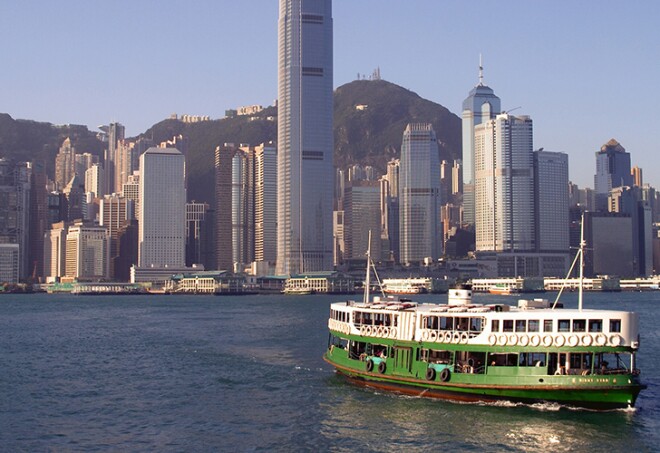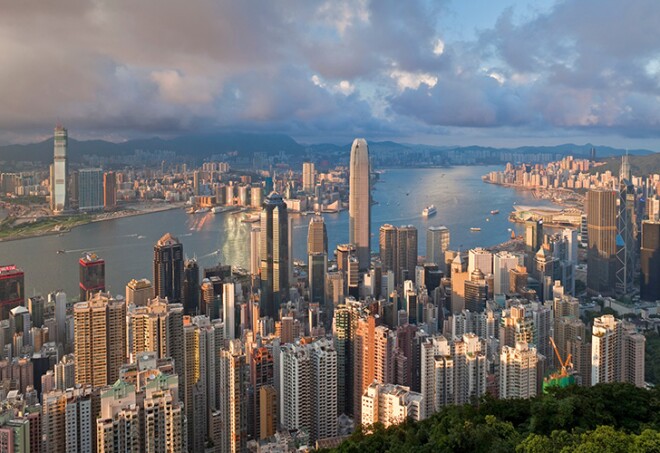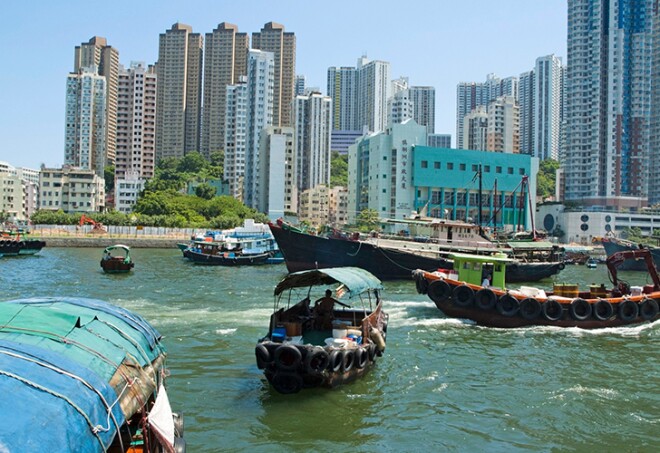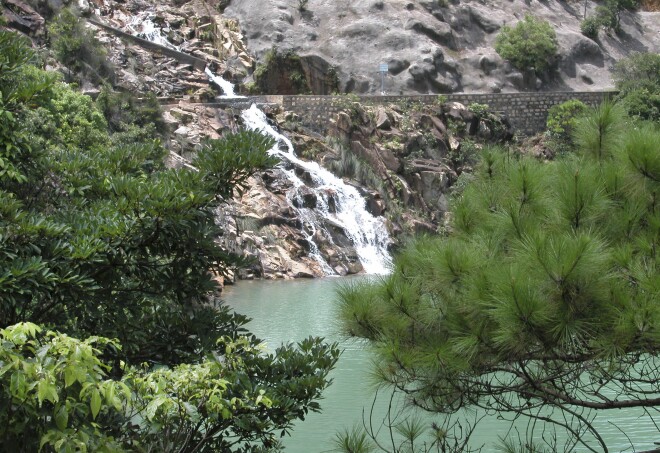The Best Things to Do in Hong Kong
Get swept up to the top of a peak, meditate in a monastery garden, and ride a ferry through a light show all in the space of a single day in Hong Kong. This busy city offers visitors sometimes startling contrasts: a hike along a rugged hilltop trail can transport you to a view of the shimmering, modern skyline that will knock whatever’s left of your breath away. Wander densely populated streets and then find yourself on a quiet length of shoreline. Welcome to the most cosmopolitan and thrilling city you may ever visit.
Ngong Ping Rd, Lantau Island, Hong Kong
The colorful Po Lin Monastery was built more than a century ago in the secluded mountains of Lantau Island. In 1993, the 112-foot-high bronze Tian Tan Buddha, also known as the Big Buddha, was erected to face the monastery and north toward the Chinese people of the mainland. Since then, Po Lin has been on the tourism map. Seated on a lotus flower and with a raised hand delivering a blessing to visitors, the Buddha welcomes visitors to climb the 268-step base to share some expansive mountain and sea views. Have a walk through the grounds of the monastery, which include the new Grand Hall of Ten Thousand Buddhas and a popular vegetarian restaurant. Though you can take a bus, train, or taxi, the 3.5-mile Ngong Ping cable car is a thrilling way to get there.
Hong Kong Island, Hong Kong
Join throngs of locals on the five-minute ferry ride across Victoria Harbour between the Tsim Sha Tsui cruise pier in Kowloon, on the mainland side, and the Central Pier on Hong Kong Island (a slightly longer ride goes to Wan Chai on Hong Kong Island). This is not just any ferry: The historic green and white Star Ferries have been moving the masses back and forth for decades, with the origins of the company going back to 1880 with the service of a single steamboat, the Morning Star. Today, the classic wooden boats make the trip many times daily, and a ride provides a great view of the city’s famous skyline and a whiff of nostalgia to boot.
Sai Kung, Hong Kong
Many visitors are surprised to learn how many great hiking trails there are around Hong Kong. In fact, believe it or not, roughly three-quarters of Hong Kong (which, remember, comprises Hong Kong Island, Kowloon, and the New Territories) is undeveloped land. The mother of all hikes is the 62-mile MacLehose Trail, which winds across much of the New Territories from Pak Tam Chung to Long Ke. It’s considered one of the most gorgeous hikes in the world. The undulating trail snakes along gorgeous beaches, past sea caves, sea stacks, and interesting columns of volcanic rock, and in the middle, climbs to Hong Kong’s highest peak, Tai Mo Shan, at 3,140 feet. Do the whole thing or what most people do, just a part; MacLehose is divided into 10 sections ranging from three to 10 miles, with campsites set up along the way (one of the best is Stage 2; the starting point is the end of Sai Kung Man Yee Road along the High Island Reservoir). Keep your eyes peeled for rhesus monkeys, wild boar, and barking deer.
2A Canton Rd, Tsim Sha Tsui, Hong Kong
This Victorian-era building complex was the headquarters of the Hong Kong Marine Police from the 1880s until 1996 (except for a few years during WWII) and was where pirates and smugglers were once imprisoned. Today, the restored complex is a combination of high-end shopping arcade, hotel, and exhibition hall, and more important, it’s a treasure chest of historic relics and a wonderful place for a stroll. The complex was vital to making Hong Kong a modern port in the days before technology. The ball at the top of its beautifully preserved Time Ball Tower, in use from 1885 to 1906, was manually raised each day and then dropped precisely at 1 p.m. to let ships recalibrate their chronometers (marine timepieces) before setting sail. Ship captains and others also checked the typhoon mast for signal flags indicating warning of severe storms. The coops along the walls of the building’s courtyard once held carrier pigeons that carried messages to and from ships in the harbor. Free guided tours are available by calling +852 2926 8000.
Tai Tam, Hong Kong
This small cove, also known as Sham Wan, is nestled in greenery at the foot of a bluff, and off the radar for most. Because it’s crowd-free, it’s a great place to get away from it all for a few hours. There are no food or drink stalls, so bring your own. The beach is the last known nesting place for Hong Kong’s endangered green turtles, so it’s closed between June and October to protect the creatures. To get there, take a junk boat from the Aberdeen Waterfront or the MTR train to Sai Wan Ho, then Bus 14. Get off just after the Tai Tam Reservoir and follow the steep steps that lead down the secluded beach.
Macau Island, Macau
Macao, the world’s largest gambling destination, is a one-hour ferry ride from downtown Hong Kong. A former Portuguese colony, Macao is now a semiautonomous special administrative region of China. Dozens of big brash casinos and their hotels fill Macao’s nine square miles: the Venetian, complete with gondolas and canals; the floral-themed Wynn Palace; the Hollywood-inspired Studio City; and the chic and elegant Parisian Macao with its own replica Eiffel Tower. There are more than a dozen Michelin-starred restaurants and no shortage of glitzy entertainment featuring theater, music, magic, and acrobatics.
Tolo Harbour, Hong Kong
This scenic and flat 20-mile round-trip bicycle route follows the waterfront promenade that wraps around Tolo Harbour, which makes a ride an excellent way to combine an easy bit of exercise with sightseeing. Enjoy views of the eight peaks of the Pat Sin Leng mountain range as you pedal and soak up the ultramodern architecture of the Hong Kong Science Park. At the Tai Po Waterfront Park, climb the 105-foot lookout tower to snap photos of panoramic harbor and park views before heading back the same way you came. The full round-trip ride takes two to three hours, depending on how often you stop for photos. Join a guided tour, or go solo and rent bikes by the Shing Mun River at Sha Tin Park near the Sha Tin MTR station.
In the early 1800s, a small fortress was built at the strategic beachhead on the Kowloon Peninsula. When the British began to occupy Hong Kong in 1841, the fortress became vital to China’s maritime defenses and so was greatly expanded. Soon a thick stone wall and watchtowers were added, and inside, a number of military buildings and soldiers quarters enlarged the fortified city even more. Though most of the complex has been destroyed or demolished over the decades, a few sections have survived, including the foundation of a former wall, remnants of the South and East Gates, and a flagstone path. A handful of relics have been recovered—from cannons to stone lintels—and are displayed in a Qing Dynasty Jiangnan-style garden park created on the site.
10號 Cotton Tree Dr, Central, Hong Kong
Hong Kong’s oldest colonial British building dates back to the 1840s and served as the office and residence of the Commander of the British Forces in Hong Kong up until 1978, when it was handed over to the government. In 1984, the Greek Revival house was reborn as the Flagstaff House Museum. Its collection of about 600 teaware items from as far back as the 11th century B.C.E. includes many fine examples of the famous Yixing teapots. Besides exhibits of tea bowls, teacups, teapots, and ewers, there are demonstrations and lectures about the significance of tea drinking to Chinese culture.
11 Man Kwong St, Central, Hong Kong
Hong Kong has been one of the world’s most important ports for eons. This museum, an especially great destination for families with children, has more than a dozen galleries with exhibits highlighting the importance of the port of Hong Kong to China’s role in world trade throughout history. There are exhibits on sea bandits and on the development of Victoria Harbour. Explore collections of navigation equipment, ship models, nautical paintings, and photographs of traditional Chinese junks. There’s a cool gallery showcasing the sounds of the sea—whistles, bells, horns, the crash of waves, the clank of halyards, the thrum of engines—and another on passenger ships, whether they carry poor immigrants or leisure cruisers. A very realistic bridge simulator will give you a feel for maneuvering a range of vessels, from huge container barges to high-speed boats and even Hong Kong’s famous Star Ferry.
31 Lugard Rd, The Peak, Hong Kong
If the weather and smog conditions cooperate, the views from the top of Victoria Peak, aka the Peak, will make your day. Go in late afternoon to catch the sunset and then the glittering, lit-up nightscape of Hong Kong. Getting up to Hong Kong Island’s highest point, at 1,800 feet above sea level, is part of the fun. You can always opt for a bus, train, or taxi, but for the best taste of Hong Kong, ride the outdoor (but covered) Mid-Levels escalators, something you won’t find anyplace in the world. It will take about 20 minutes to travel via the series of 20 escalators and three moving walkways up to the Peak Tram, a historic century-old funicular railway that makes the rest of the steep trip to the top.
Aberdeen Praya Rd, Aberdeen, Hong Kong
A visit to Hong Kong isn’t complete without a ride on a sampan. Head to the Aberdeen Promenade along the southwestern shoreline of Hong Kong Island and hop aboard a sampan, one of the small local boats operated mostly by elderly Tanka and Hoklo women who hail from the traditional boat-dwelling seafaring community. For the equivalent of about $10 per person, get a 30-minute ride around Aberdeen Harbour, under Ap Lei Chau Bridge, and past the other junks, houseboats, trawlers, fancy yachts, and even giant cargo vessels and cruise ships. For a voyage with a bit more emphasis on sightseeing, try one of the two popular red-sailed junks—the historic 36-passenger Duk Ling and the replica 80-passenger Aqua Luna—that can be boarded either from the Tsim Sha Tsui Piers or Central Pier 9.
Discovery Bay Rd, Discovery Bay, Hong Kong
For a refreshing splash of natural beauty amid the urban landscape of Lantau, the largest of Hong Kong’s islands, head to the Discovery Bay rock pools. This oasis that seems to pop out of nowhere is a great way to cool off on a balmy summer weekday—avoid weekends, though, when seemingly everyone else in the city has the same idea. A short 15-minute walk from the Discovery Bay ferry pier, in the direction of the Discovery Bay Golf Club, this miniature valley of boulders, waterfalls, and natural pools surrounded by cool greenery is definitely worth the trip.
118/F, The Ritz-Carlton, Hong Kong, 1 Austin Rd W, Tsim Sha Tsui, Hong Kong
This hip bar, perched 118 floors up at the top of the International Commerce Centre (ICC) building in the Ritz-Carlton, Hong Kong, claims to be the highest bar in the world, and it sure feels like it. And it’s not only way up there, it’s way out there. Sunday brunches may be genteel, but at night, the bar’s lighting is a retina-straining mélange of psychedelic pinks and purples to complement the dazzling cityscape below. If the sky is smog-free, the views are worth every penny of the pricey cocktails.
Hong Kong
A rocky, reptilianlike spine runs through the center of Hong Kong Island, and there are some 30 miles of hiking trails spreading over it like arteries, offering visitors exercise along with excellent sightseeing. One of the most popular sections is the three-mile Dragon’s Back trek that follows the undulating ridge on the southern end of Hong Kong Island, between Wan Cham Shan and Shek O Peak. The walk isn’t strenuous, but the views may take your breath away. All along the way, soak up panoramas of the island and the sea. The entrance to the hike is on Shek O Road near To Tei Wan village, and the trek should take about 4-5 hours.
1 Man Lam Rd, Sha Tin, Hong Kong
If you go to only one Hong Kong museum, this balanced and all-encompassing collection of the ancient and the new should be it. Five permanent exhibits include one on Han Dynasty pottery sculptures dating back more than 2,000 years as well as a gallery devoted to Cantonese opera, with a replica theater and period accoutrements, including hair accessories, robes, and dressing tables. Other exhibits focus on the popular martial arts novels of Jin Yong that were adapted into movies and TV series, with film clips and early manuscripts among the highlights. Other parts of the museum showcase the opium trade, British rule, and fine and decorative Chinese art, plus special exhibitions on subjects like Bruce Lee, with memorabilia and a documentary on his life.
A novel way to combine great food with a classic city tour, the double-decker Crystal Bus provides delicious sightseeing. Nibble Chinese dim sum prepared by the restaurant One Dim Sum (which was awarded a Michelin star in 2012), while driving past more than 20 of Hong Kong’s most famous sites (and stopping at one for photos), from the Hong Kong clock tower to the 1881 Heritage Building, a 197-foot-high Ferris wheel, and Portland Street, the city’s famous red-light district, known for its neon. Each tour—one at lunch goes from Kowloon to Hong Kong Island and another at teatime from Kowloon to New Territories—lasts about 2.5 hours. Both start at No. 7 Hankow Road, Tsim Sha Tsui, in Kowloon.
Sharp Island, Hong Kong
Located in the Hong Kong UNESCO Global Geopark in the eastern and northeastern reaches of New Territories, teeny-tiny Sharp Island offers a great way to get a gander at Hong Kong’s fascinating ancient geological past. Set off on a two-mile trek that weaves around the island. The walk starts at the pretty crescent-shaped Hap Mun Bay Beach, also known as Half Moon Bay (pack your swimsuit and towel), and ends at the Sharp Island Pier. Along the way check out the volcanic rocks—some even resemble pineapples. For fun, when the tide is low, walk across the rocky tombolo, or spit, to the tiny islet of Kiu Tau. To get to Sharp Island, take MTR Diamond Hill Exit C2, then hop aboard bus 92 to Sai Kung Town; next, take a 15-minute kaito (ferry) boat at the Sai Kung Public Pier to Hap Mun Bay; then leave the island from the Sharp Island Pier.
Big Wave Bay Rd, Big Wave Bay, Hong Kong
Another Hong Kong “who knew?"—you can surf right off of Hong Kong Island at the aptly named Big Wave Bay Beach. Follow the local surfers to the scenic eastern end of the island near the Dragon’s Back hiking trails. It’s considered the best spot in Hong Kong for beginners; there are board rentals and lessons, too. Expect weekends to be crowded. While you’re there, check out prehistoric rock carvings nearby that depict animals and geometric designs, similar to other carvings found along the shoreline of Hong Kong. To reach the beach, get out at the MTR Shau Kei Wan Station, Exit A2, and then take the red mini bus marked Shek O.
Lantau Island, Hong Kong
Disneyland in Hong Kong is ideal for families with young kiddos. As the smallest of Disney’s worldwide parks, it’s easily walkable, and the tram service can get you where you want to go. Character meet-and-greet photo sessions are scheduled throughout the day and so are parades and shows like the 30-minute Festival of the Lion King, with acrobats and fire dancers playing the roles of Simba, Timon, and Pumbaa. The park is divided into themed sections: In Grizzly Gulch, rides and shows follow a Wild West frontier theme; in Fantasyland, the gentler mood focuses on Cinderella, Dumbo, Winnie the Pooh, Sleeping Beauty, and Snow White; Tomorrowland looks to the future with Buzz Lightyear, Iron Man, and Star Wars characters taking center stage; and Adventureland offers a jungle river cruise and Tarzan’s tree house. The park makes a great day out.
Hong Kong’s tram system dates back to 1904 and still plies some of the same routes, stopping on average every 820 feet. Locals affectionately call the trams Ding Ding because of the bells rung when the trams approach a stop. The main line runs across the whole northern edge of Hong Kong Island, along what was once the waterfront, between Kennedy Bay and Shau Kei Wan Road, passing through the Central Business District and bustling Causeway Bay area. The six routes cover 19 miles and more than 100 stops. Most cars are double-decker and were rebuilt in the 1980s or later, but No. 120 dates back to the 1950s and still sports seats made of rattan and teakwood.
Nan Lian Garden, 60號 Fung Tak Rd, Diamond Hill, Hong Kong
A serene respite from the towering urban sprawl nearby, this traditional Tang Dynasty–style landscaped garden is based on the design of the famous Jiangshouju Garden in Shanxi Province. Winding paths lead visitors past pines, cypress, and fragrant flowering trees. Set on Diamond Hill in Kowloon with the vast northern mountain range as the backdrop, the lovely park has been designed with artificial hillocks, ornamental rocks, waterfalls, and koi ponds to encourage quiet walks and reflection. Think of it as an outdoor museum for the soul and a place representing Chinese cultural ideals. A striking gilded pagoda and a pair of arched red wooden bridges are the focal points of a lotus pond and a favorite photo subject. To linger longer, enjoy a meal at the vegetarian café on-site.
Man Mo Temple, 124-126 Hollywood Rd, Tai Ping Shan, Hong Kong
Man Mo Temple was built by wealthy Chinese merchants between 1847 and 1862 as a tribute to the God of Literature (man) and the God of War (mo). Both deities were worshiped by ambitious students eager to succeed in the rigorous civil examinations of imperial China; good grades paved the way for a prestigious career in government administration. Today, tucked in the shadows of hulking apartment towers on busy Hollywood Road, it’s Hong Kong Island’s oldest temple and probably its most well known. The dimly lit Man Mo, with its carved wooden panels, ornate ceramic figurines, plaster moldings, murals, and giant incense coils hanging from the ceiling, feels wonderfully ethereal. A visit to Man Mo is a step off the grid in frenetic Hong Kong.
































